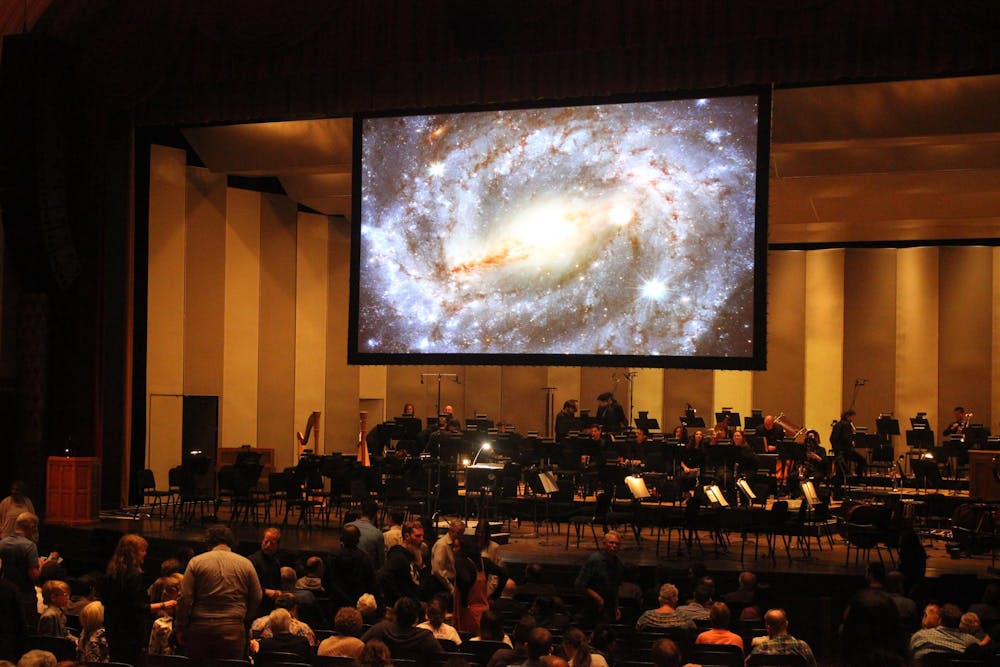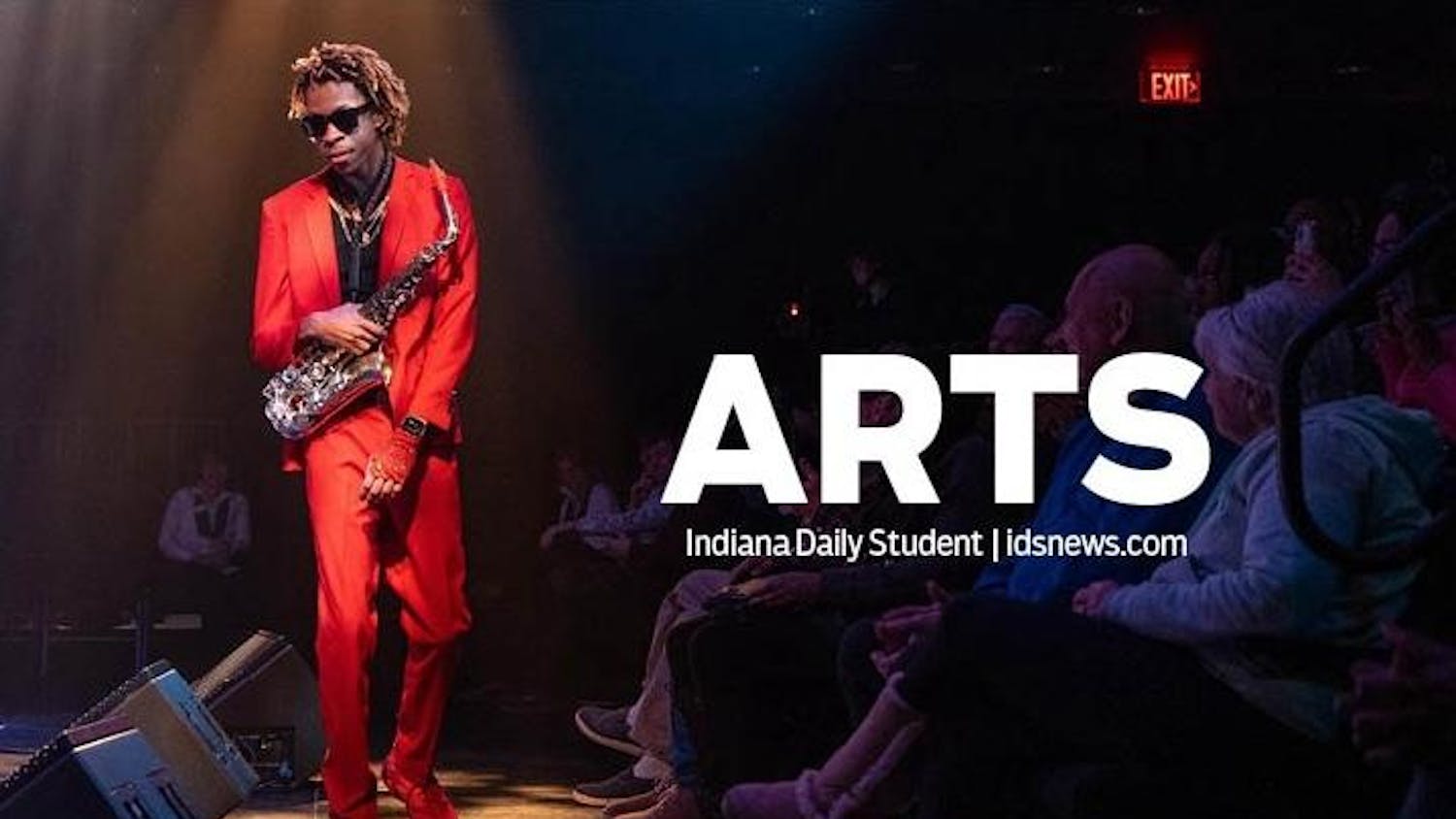As the minutes ticked past 8 p.m., the audience settled in their auditorium seats and the Jacobs School of Music Concert Orchestra members practiced asynchronously for their performance on April 8, the night of the 2024 solar eclipse.
Abra K. Bush, the dean at the Jacobs School of Music, made her way to the IU Auditorium stage’s podium to congratulate IU students and faculty who participated in the Hoosier Cosmic Celebration at Memorial Stadium. Bush thanked those involved in planning the performance and welcomed a special and unexpected guest: William Shatner.
William Shatner, a Canadian actor known for his role as James T. Kirk in the Star Trek franchise, walked on stage amidst resounding applause. Shatner was in Bloomington to experience the April 8 solar eclipse.
“Music!” Shatner said. “It’s everywhere.”
Shatner began to narrate a story of his appearance at the John F. Kennedy Center for Performing Arts, entertaining with his own songs, and what it was like to work with singer-songwriter Ben Folds to learn how to perform in front of an orchestra, which he said he had yet to master. Shatner announced his album, “Shatner Live at the Kennedy Center” which he said would be released momentarily.
As Shatner left, Emilia Sharpe, winner of the Barber Violin Concerto Competition, took to the stage for her violin concerto. Sharpe is a master's student at the Jacobs School of Music studying with Kevork Mardirossian, a distinguished professor of violin appointed by the Jacobs School of Music in 2008. She earned her bachelor’s degree from the Robert Schumann Hochschule in Düsseldorf, Germany and held an apprenticeship with the Bochumer Symphoniker orchestra.
Wearing a glimmering emerald gown, Sharpe performed Samuel Barber’s 1939 Violin Concerto Op. 14, consisting of “Allegro,” “Andante” and “Presto in moto perpetuo.” As Sharpe’s concerto ended, she bowed to a standing ovation and was handed a large bouquet of flowers on stage. Sharpe exited the stage, and a brief intermission began.
Concert orchestra members still on stage continued to practice as a large screen lowered for the next portion of the show, “The Planets – An HD Odyssey.” Paired with the concert orchestra’s performance of Gustav Holst’s “The Planets, Op. 32,” a film, created by Duncan Copp depicting high-definition images of modern space exploration would be screened, intended to visually represent Holst’s seven-movement orchestral suite. Created by Holst from 1914 to 1916, each movement is meant to convey each planet’s astrological character.
Elyse Beebe and Robert Kirkwood were sipping on drinks as they waited for the show to resume. Kirkwood travelled from Ottawa, Canada to view the eclipse with his partner Beebe, who lives in the Bloomington area. He shared he had always been a fan of Gustav Holst’s “The Planets.”
“I’ve listened to it many times,” Kirkwood said. “She had mentioned that it’s playing here, and we decided that it would be great to hear live.”
Kirkwood shared that while he listened to classical music, he had only seen a live orchestra perform a handful of times.
“Perfect pairing for the eclipse,” Beebe said. “Something spacey and musical.”
The second portion of the concert began as intermission ended at 9 p.m. on the dot. The screen began to display opening credits, and special guest Dr. Mae Jemison approached the stage’s podium.
Dr. Mae Jemison, NASA’s first science mission specialist, was the first woman of color to travel into space aboard the 1992 space shuttle “Endeavour.” The inductee of both the National Women’s Hall of Fame and the International Space Hall of Fame narrated the Jacobs School of Music Concert Orchestra’s rendition of Holst’s “The Planets,” providing context and information between each movement. Jemison’s spoken text was written by Jacobs School of Music visiting lecturer Gabriel Lubell.
“It’s little wonder that for millennia, people have sensed magic in the night sky and that music has connected our earthly lives with the eternal,” Jemison said. “When Gustav Holst wrote the music we are about to hear, he was participating in precisely that tradition. ‘The Planets’ is not music born of today’s science, yet we must recognize that Holst’s creation was based on the knowledge, understanding and myths from decades, centuries and thousands of years of people’s observations.”
After Jemison’s introduction, the Jacobs School of Music Concert Orchestra, conducted by Jeffery Meyer, began to perform Holst’s first movement: “Mars, the Bringer of War.” With Jemison’s intermittent narration, for the following hour the concert orchestra would perform all of Holst’s suite, “Venus, the Bringer of Peace,” “Mercury, the Winged Mesenger,” “Jupiter, the Bringer of Jollity,” “Saturn, the Bringer of Old Age,” “Uranus, the Magician” and “Neptune, the Mystic,” partnered with Copp’s visual representation of each planet presented on the large auditorium screen.
As the performance ended just past 10 p.m., the concert orchestra all bowed with Meyer and Jemison. The crowd began to exit the auditorium and were greeted by the warm night air of a spring Bloomington evening.
Steve Boone from Southeast Indiana said his family lived just outside of the path of totality. His son’s partner is a student at IU, so they were visiting to experience the eclipse with her. Boone said she arranged the tickets for his family to attend the concert, which he enjoyed.
“That was really something, its juxtaposition with the eclipse,” Boone said. “‘The Planets’ is one of my family’s absolute favorite pieces. When we found out about it, we had to come.”




